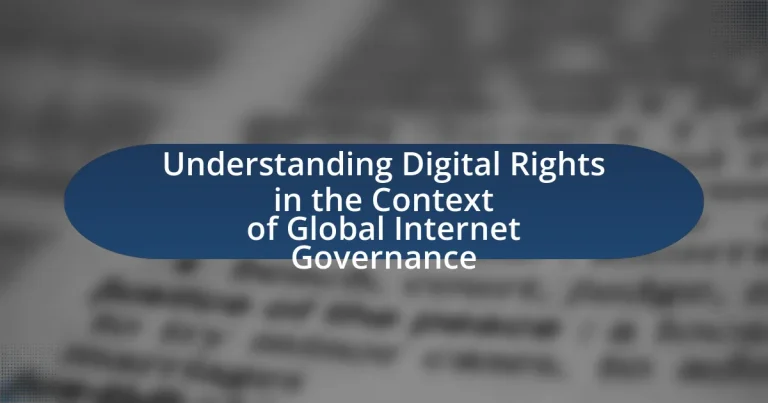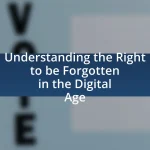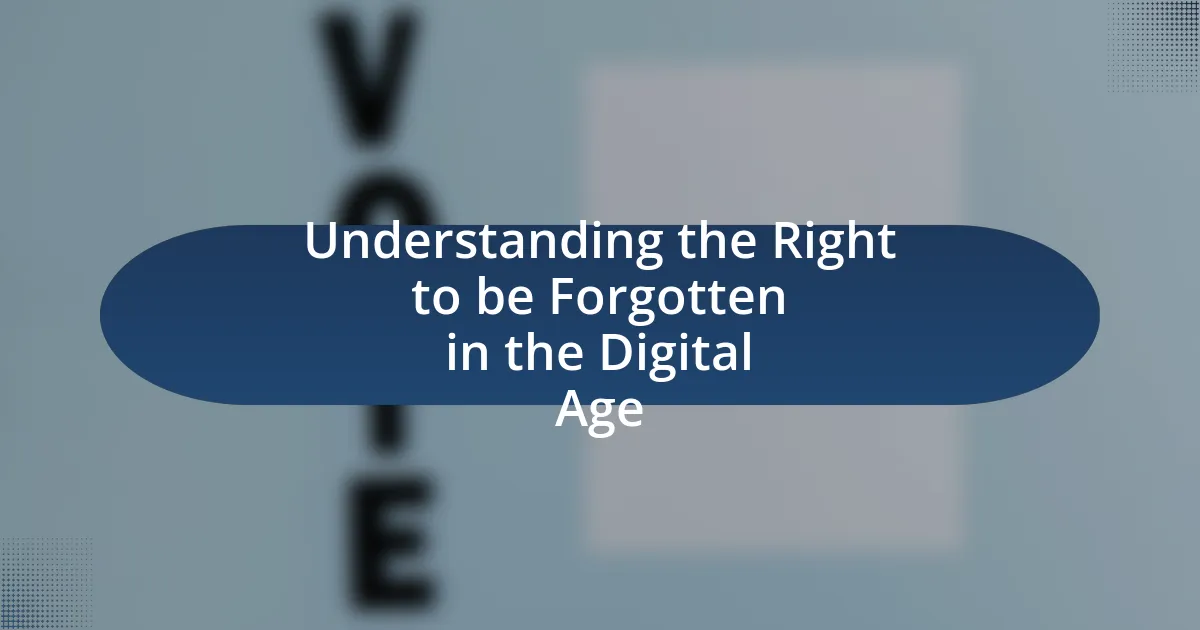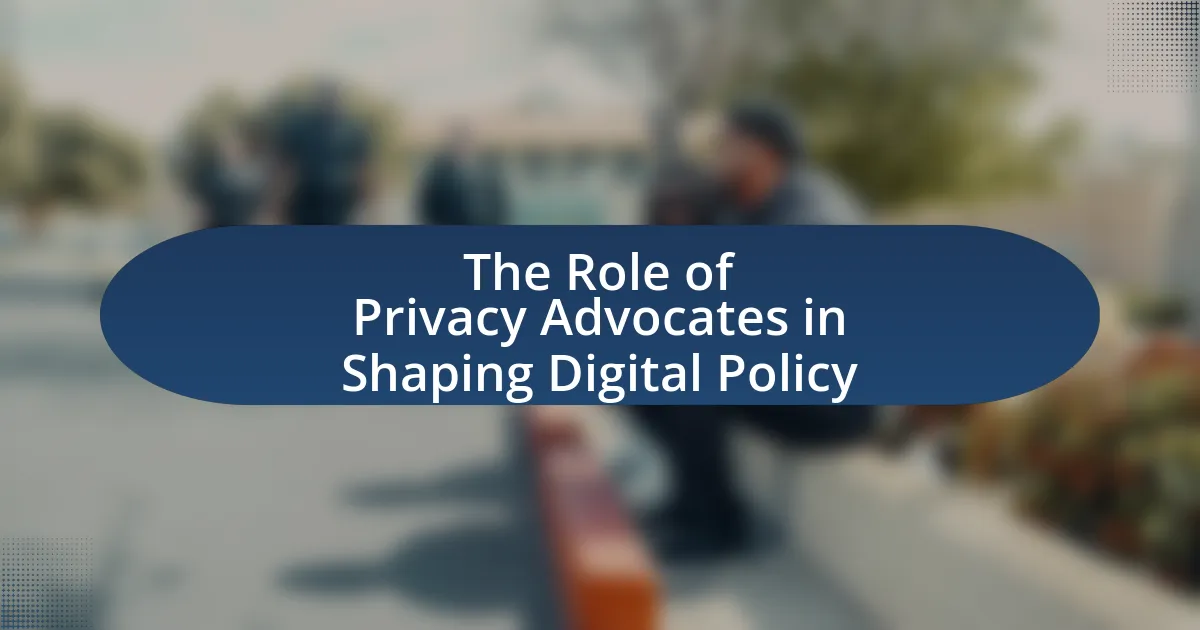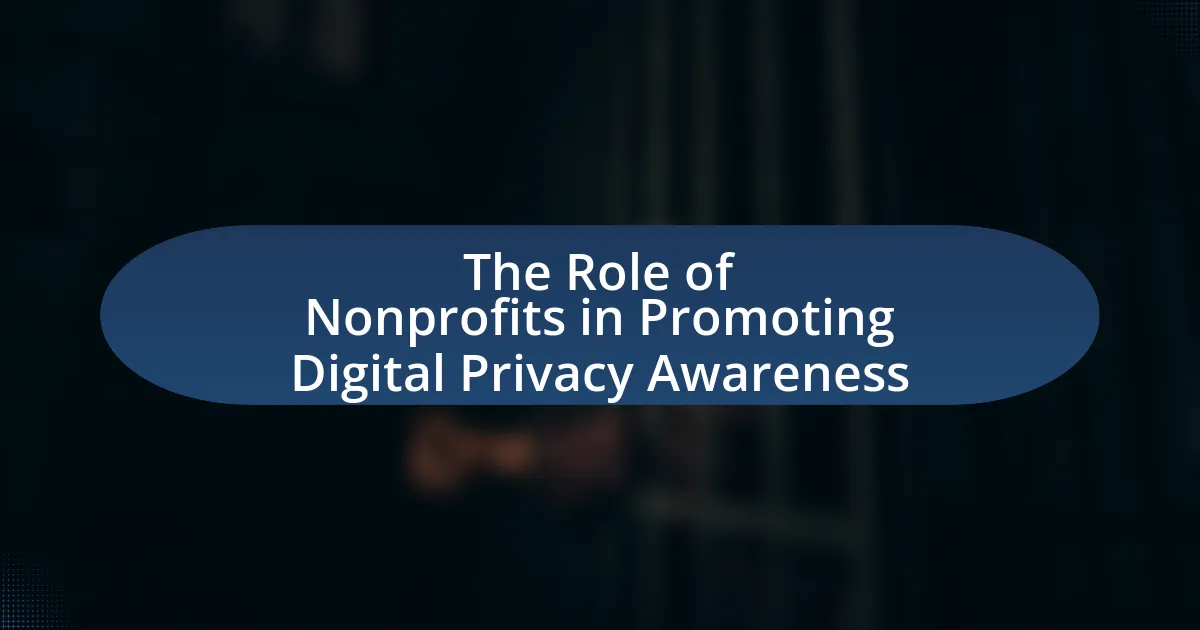Digital rights refer to the entitlements and freedoms individuals possess regarding their online activities, including access to information, privacy, freedom of expression, and protection from discrimination. This article explores the significance of digital rights within the framework of global internet governance, emphasizing their role in safeguarding individual freedoms and promoting equitable access to the internet. It examines specific digital rights, the impact of global governance on these rights, the challenges faced in their protection, and the influence of emerging technologies such as artificial intelligence and blockchain. Additionally, the article discusses the enforcement of digital rights across different jurisdictions and the role of civil society organizations in advocating for these rights.
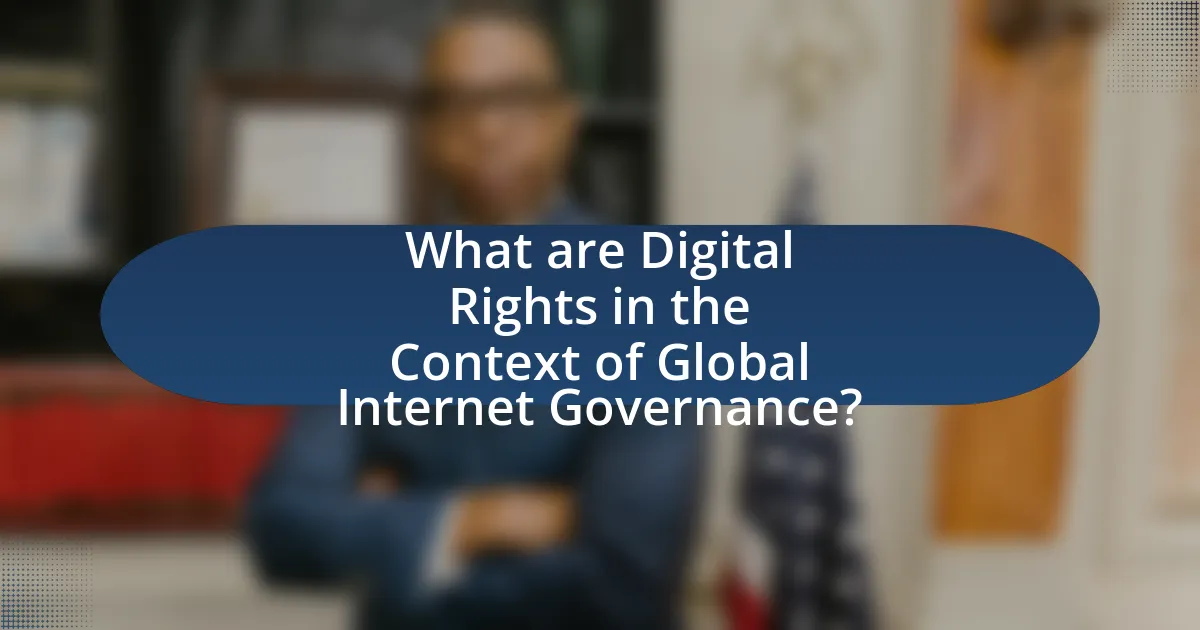
What are Digital Rights in the Context of Global Internet Governance?
Digital rights in the context of global internet governance refer to the entitlements and freedoms individuals have regarding their online activities, including access to information, privacy, freedom of expression, and protection from discrimination. These rights are increasingly recognized as essential components of human rights in the digital age, as outlined in documents such as the Universal Declaration of Human Rights and the Internet Governance Forum’s principles. The acknowledgment of digital rights is crucial for ensuring equitable access to the internet and safeguarding users against abuses by both state and non-state actors, thereby promoting a more inclusive and secure digital environment.
How do Digital Rights relate to individual freedoms online?
Digital rights are essential to safeguarding individual freedoms online, as they encompass the rights to access, use, create, and share digital content without undue interference. These rights ensure that individuals can express themselves freely, access information, and participate in digital spaces without fear of censorship or surveillance. For instance, the Universal Declaration of Human Rights recognizes freedom of expression and access to information as fundamental human rights, which are increasingly relevant in the digital age. Furthermore, studies indicate that countries with strong digital rights frameworks tend to have higher levels of internet freedom and user trust, reinforcing the connection between digital rights and individual freedoms online.
What specific rights are considered digital rights?
Digital rights encompass specific rights related to the use of the internet and digital technologies, including the right to access information, the right to privacy, the right to freedom of expression, and the right to digital security. These rights are recognized in various international frameworks, such as the Universal Declaration of Human Rights, which asserts that everyone has the right to seek, receive, and impart information and ideas through any media regardless of frontiers. Additionally, the International Covenant on Civil and Political Rights emphasizes the importance of privacy and freedom of expression in the digital realm, reinforcing that these rights must be protected online just as they are offline.
How do digital rights impact freedom of expression?
Digital rights significantly impact freedom of expression by ensuring individuals have the ability to communicate freely online without censorship or surveillance. These rights encompass access to information, privacy protections, and the ability to express opinions without fear of retribution. For instance, the United Nations Human Rights Council has affirmed that the same rights people have offline must also be protected online, emphasizing that restrictions on digital rights can lead to violations of freedom of expression. Furthermore, research indicates that countries with strong digital rights frameworks tend to have higher levels of free speech and public discourse, as seen in nations that uphold net neutrality and protect user data.
Why is Global Internet Governance important for Digital Rights?
Global Internet Governance is crucial for Digital Rights because it establishes the frameworks and policies that protect individuals’ online freedoms and privacy. Effective governance ensures that digital rights, such as freedom of expression, access to information, and data protection, are upheld globally. For instance, the Internet Governance Forum (IGF) facilitates multi-stakeholder dialogue, promoting inclusive policies that safeguard these rights. Furthermore, international agreements, like the General Data Protection Regulation (GDPR) in Europe, set standards that influence global practices, reinforcing the importance of governance in protecting digital rights across borders.
What role do international organizations play in shaping digital rights?
International organizations play a crucial role in shaping digital rights by establishing frameworks, guidelines, and standards that promote and protect these rights globally. For instance, the United Nations has emphasized the importance of human rights in the digital realm through resolutions and reports, such as the 2016 Human Rights Council resolution affirming that the same rights that people have offline must also be protected online. Additionally, organizations like the Internet Governance Forum facilitate multi-stakeholder dialogue, bringing together governments, civil society, and the private sector to address digital rights issues. These efforts are supported by various treaties and declarations that advocate for privacy, freedom of expression, and access to information, thereby influencing national policies and practices worldwide.
How do national policies influence global digital rights frameworks?
National policies significantly shape global digital rights frameworks by establishing legal standards and practices that can be adopted or adapted by other nations. For instance, the European Union’s General Data Protection Regulation (GDPR) has set a precedent for data privacy laws worldwide, prompting countries like Brazil and Japan to implement similar regulations. This influence occurs as nations observe and respond to the policies of others, leading to a convergence of legal norms that address digital rights on a global scale. Additionally, international agreements and collaborations, such as the United Nations’ efforts to promote human rights in the digital age, are often informed by the policies of member states, further integrating national approaches into a cohesive global framework.
What challenges exist in protecting Digital Rights globally?
Protecting digital rights globally faces significant challenges, including varying legal frameworks, government surveillance, and the digital divide. Different countries have distinct laws regarding privacy, data protection, and freedom of expression, leading to inconsistencies in how digital rights are upheld. For instance, the General Data Protection Regulation (GDPR) in the European Union contrasts sharply with more lenient regulations in other regions, complicating international compliance for companies. Additionally, government surveillance practices, often justified by national security concerns, infringe on individual privacy rights, as seen in cases like the United States’ National Security Agency (NSA) surveillance revelations. Furthermore, the digital divide exacerbates these challenges, as marginalized communities may lack access to technology and the internet, limiting their ability to exercise their digital rights effectively. These factors collectively hinder the establishment of a cohesive global framework for protecting digital rights.
How do issues of censorship affect digital rights?
Censorship significantly undermines digital rights by restricting freedom of expression and access to information. When governments or organizations impose censorship, they limit individuals’ ability to communicate freely and access diverse viewpoints, which are fundamental components of digital rights. For instance, according to the Freedom House report “Freedom on the Net 2021,” 45% of internet users live in countries where online censorship is prevalent, impacting their ability to engage in open discourse and access critical information. This suppression not only stifles personal expression but also hinders democratic processes and the ability to hold authorities accountable, thereby eroding the foundational principles of digital rights.
What are the implications of surveillance on digital rights?
Surveillance significantly undermines digital rights by infringing on privacy, freedom of expression, and the right to information. The pervasive monitoring of online activities can lead to self-censorship, as individuals may alter their behavior due to fear of being watched, which directly impacts their ability to express opinions freely. According to a report by the Electronic Frontier Foundation, surveillance practices often disproportionately affect marginalized communities, exacerbating existing inequalities and limiting their access to information and resources. Furthermore, the lack of transparency in surveillance operations can erode trust in digital platforms and institutions, ultimately hindering the exercise of digital rights.
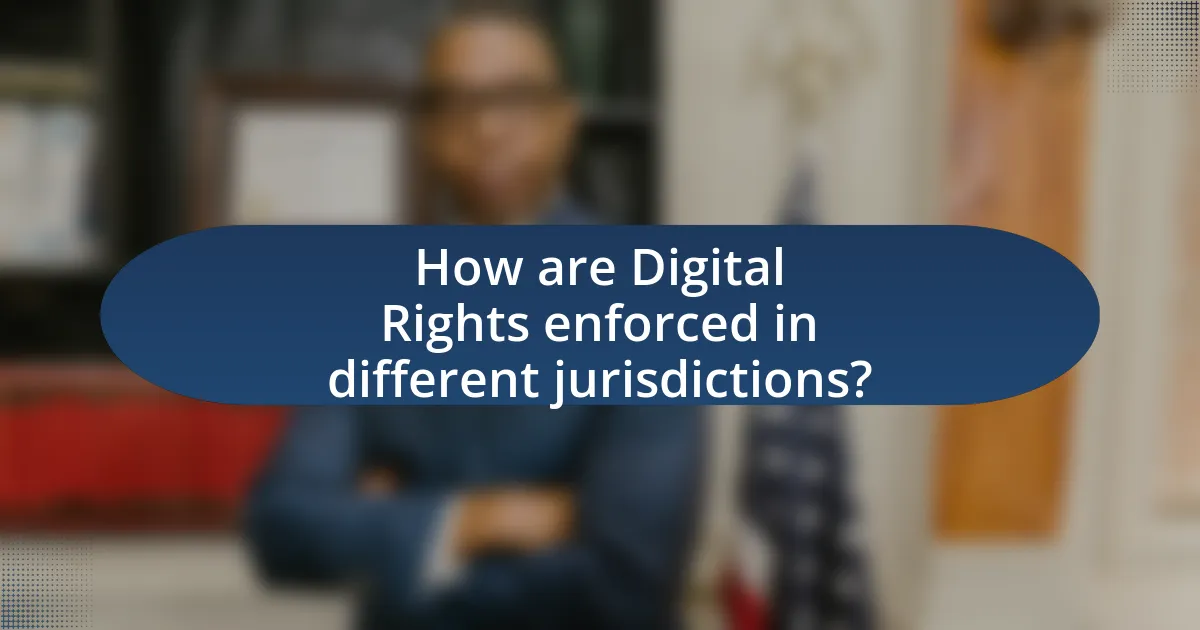
How are Digital Rights enforced in different jurisdictions?
Digital rights are enforced in different jurisdictions through a combination of national laws, international treaties, and regulatory frameworks. For instance, the European Union enforces digital rights primarily through the General Data Protection Regulation (GDPR), which provides stringent data protection and privacy rights for individuals. In contrast, the United States relies on a patchwork of federal and state laws, such as the California Consumer Privacy Act (CCPA), which offers specific rights regarding personal data. Additionally, countries like Brazil have enacted their own comprehensive data protection laws, such as the Lei Geral de Proteção de Dados (LGPD), which aligns closely with the GDPR. These varying approaches reflect the diverse legal landscapes and cultural attitudes towards digital rights across jurisdictions, highlighting the importance of local context in enforcement mechanisms.
What legal frameworks exist for protecting Digital Rights?
Legal frameworks for protecting digital rights include the General Data Protection Regulation (GDPR) in the European Union, which establishes strict guidelines for data privacy and user consent. Additionally, the California Consumer Privacy Act (CCPA) provides similar protections in the United States, granting consumers rights over their personal data. Internationally, the Universal Declaration of Human Rights recognizes the right to privacy and freedom of expression, which are foundational to digital rights. These frameworks collectively aim to safeguard individuals’ online privacy, data protection, and freedom of expression, reflecting a growing recognition of digital rights as essential human rights in the context of global internet governance.
How do different countries approach digital rights legislation?
Different countries approach digital rights legislation through varying frameworks that reflect their political, cultural, and legal contexts. For instance, the European Union has established comprehensive regulations like the General Data Protection Regulation (GDPR), which emphasizes user consent and data protection, influencing global standards. In contrast, the United States adopts a more fragmented approach, with sector-specific laws such as the Children’s Online Privacy Protection Act (COPPA) and the California Consumer Privacy Act (CCPA), focusing on consumer protection without a unified federal framework. Meanwhile, countries like China implement strict internet censorship and surveillance policies, prioritizing state control over individual rights. These diverse approaches illustrate how national priorities shape digital rights legislation, impacting citizens’ online freedoms and privacy.
What are the consequences of non-compliance with digital rights laws?
Non-compliance with digital rights laws can lead to significant legal and financial repercussions for individuals and organizations. Entities that violate these laws may face hefty fines, which can range from thousands to millions of dollars, depending on the severity of the infringement and the jurisdiction. For instance, the General Data Protection Regulation (GDPR) in the European Union imposes fines of up to 4% of annual global turnover or €20 million, whichever is greater, for non-compliance. Additionally, non-compliance can result in legal actions, including lawsuits from affected individuals or regulatory bodies, which can further escalate costs and damage reputations. Furthermore, organizations may experience loss of customer trust and brand integrity, leading to decreased market share and revenue.
How do civil society organizations contribute to the enforcement of Digital Rights?
Civil society organizations contribute to the enforcement of digital rights by advocating for policy changes, raising public awareness, and holding governments and corporations accountable. These organizations often engage in legal actions, provide resources for individuals to understand their rights, and monitor compliance with international human rights standards. For instance, organizations like the Electronic Frontier Foundation and Access Now have successfully challenged restrictive laws and practices, thereby reinforcing the protection of digital rights globally. Their efforts are supported by data showing that countries with active civil society engagement tend to have stronger legal frameworks for digital rights, as evidenced by various reports from the United Nations and other human rights bodies.
What strategies do these organizations use to advocate for digital rights?
Organizations advocating for digital rights employ strategies such as policy advocacy, public awareness campaigns, and coalition building. Policy advocacy involves lobbying governments and international bodies to create and enforce laws that protect digital rights, such as privacy and freedom of expression. Public awareness campaigns educate the public about digital rights issues, using social media and traditional media to reach a broad audience. Coalition building brings together diverse stakeholders, including civil society, academia, and the private sector, to strengthen their collective voice and influence in global internet governance discussions. These strategies are supported by evidence of increased public engagement and legislative changes in favor of digital rights in various countries.
How effective are grassroots movements in influencing digital rights policies?
Grassroots movements are highly effective in influencing digital rights policies. These movements mobilize public support, raise awareness, and advocate for policy changes, often leading to significant legislative outcomes. For instance, the Stop Online Piracy Act (SOPA) and Protect IP Act (PIPA) faced massive opposition from grassroots campaigns, resulting in their withdrawal in 2012. Additionally, organizations like Electronic Frontier Foundation (EFF) and Access Now have successfully lobbied for privacy protections and net neutrality, demonstrating the tangible impact of grassroots activism on digital rights legislation.
What role does technology play in the enforcement of Digital Rights?
Technology plays a crucial role in the enforcement of Digital Rights by providing tools and frameworks that facilitate monitoring, compliance, and protection of these rights. For instance, encryption technologies safeguard user data and privacy, while blockchain can enhance transparency and accountability in digital transactions. Additionally, artificial intelligence is increasingly used to detect and combat online harassment and misinformation, thereby upholding users’ rights to a safe digital environment. The implementation of these technologies is supported by legal frameworks, such as the General Data Protection Regulation (GDPR) in Europe, which mandates organizations to protect personal data and privacy, demonstrating the intersection of technology and legal enforcement in the realm of Digital Rights.
How can technology be used to protect digital rights?
Technology can be used to protect digital rights through encryption, which secures personal data and communications from unauthorized access. Encryption technologies, such as end-to-end encryption in messaging apps, ensure that only the intended recipients can read the messages, thereby safeguarding user privacy. Additionally, blockchain technology can enhance transparency and accountability in digital transactions, allowing users to maintain control over their data and digital identities. According to a report by the Electronic Frontier Foundation, encryption is essential for protecting free expression and privacy online, as it prevents surveillance and data breaches. These technological measures collectively contribute to the protection of digital rights in an increasingly interconnected world.
What are the risks of technology undermining digital rights?
The risks of technology undermining digital rights include increased surveillance, data privacy violations, and the erosion of freedom of expression. Surveillance technologies, such as facial recognition and data tracking, enable governments and corporations to monitor individuals without consent, leading to a chilling effect on free speech. Data privacy violations occur when personal information is collected, stored, and exploited without adequate protections, as seen in numerous data breaches affecting millions of users. Furthermore, the rise of misinformation and content moderation practices can restrict freedom of expression, as platforms may censor legitimate discourse under the guise of combating harmful content. These risks highlight the need for robust digital rights protections in the evolving landscape of global internet governance.
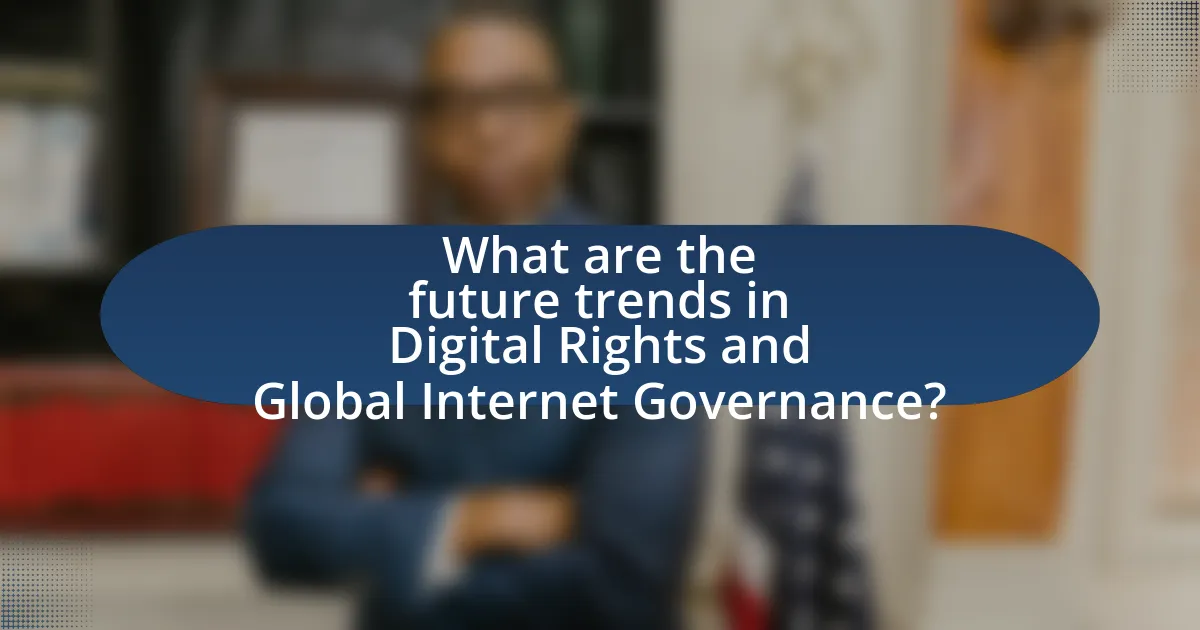
What are the future trends in Digital Rights and Global Internet Governance?
Future trends in Digital Rights and Global Internet Governance include increased emphasis on data privacy, enhanced regulatory frameworks, and the rise of decentralized technologies. As governments and organizations recognize the importance of protecting individual data, regulations like the General Data Protection Regulation (GDPR) in Europe set a precedent for similar laws worldwide, influencing global standards for data protection. Additionally, the growing adoption of blockchain and decentralized platforms is reshaping governance structures, allowing for more user control over personal information. Reports from organizations such as the Internet Governance Forum highlight these shifts, indicating a collective movement towards more inclusive and equitable digital rights frameworks.
How is the rise of artificial intelligence impacting Digital Rights?
The rise of artificial intelligence is significantly impacting digital rights by raising concerns about privacy, data protection, and algorithmic bias. As AI systems increasingly process vast amounts of personal data, individuals face heightened risks of surveillance and unauthorized data usage, which can infringe upon their right to privacy. For instance, the implementation of AI in facial recognition technology has led to debates over consent and the potential for misuse by governments and corporations. Furthermore, algorithmic bias in AI can result in discrimination, undermining the principle of equality and fairness in digital rights. Reports from organizations like the Electronic Frontier Foundation highlight these issues, emphasizing the need for robust regulations to protect individuals’ digital rights in an AI-driven landscape.
What ethical considerations arise from AI in relation to digital rights?
Ethical considerations arising from AI in relation to digital rights include issues of privacy, consent, and algorithmic bias. Privacy concerns stem from AI’s ability to collect, analyze, and store vast amounts of personal data, often without explicit user consent, which can infringe on individuals’ rights to control their own information. Consent is complicated by the opaque nature of AI systems, making it difficult for users to understand how their data is being used. Additionally, algorithmic bias can lead to discrimination against certain groups, violating principles of fairness and equality in digital rights. These considerations highlight the need for robust regulatory frameworks to protect individuals’ rights in an increasingly AI-driven digital landscape.
How can AI be regulated to protect digital rights?
AI can be regulated to protect digital rights through the establishment of comprehensive legal frameworks that enforce transparency, accountability, and user consent. These frameworks can include specific regulations that mandate AI systems to disclose their data usage practices, ensuring users are informed about how their data is collected and utilized. For instance, the General Data Protection Regulation (GDPR) in the European Union sets a precedent by requiring organizations to obtain explicit consent from users before processing their personal data, thereby safeguarding individual privacy rights. Additionally, regulatory bodies can implement standards for algorithmic fairness and bias mitigation, ensuring that AI systems do not perpetuate discrimination or inequality. By enforcing these regulations, governments can create a safer digital environment that upholds the rights of individuals in the face of advancing AI technologies.
What emerging technologies pose new challenges for Digital Rights?
Emerging technologies such as artificial intelligence, blockchain, and the Internet of Things (IoT) pose significant challenges for digital rights. Artificial intelligence can lead to privacy violations through data collection and surveillance, as algorithms often require vast amounts of personal data to function effectively. Blockchain technology, while promoting transparency, can also complicate data ownership and user consent, as transactions are immutable and can be traced indefinitely. The Internet of Things introduces vulnerabilities in personal devices, increasing the risk of unauthorized access to sensitive information. These technologies collectively challenge existing frameworks for protecting individual rights, necessitating new regulations and policies to safeguard privacy, consent, and data ownership in an increasingly digital world.
How does blockchain technology affect digital rights management?
Blockchain technology enhances digital rights management by providing a decentralized and transparent system for tracking ownership and usage rights of digital content. This technology allows creators to register their works on a blockchain, ensuring immutable proof of ownership and enabling automated royalty payments through smart contracts. For instance, a study by the World Intellectual Property Organization (WIPO) highlights that blockchain can reduce piracy and unauthorized use by creating a verifiable record of rights holders. This shift towards a decentralized model empowers creators and reduces reliance on traditional intermediaries, thereby streamlining the management of digital rights.
What are the implications of 5G technology on digital rights?
5G technology significantly impacts digital rights by enhancing connectivity and data transfer speeds, which can lead to increased surveillance and data privacy concerns. The deployment of 5G networks facilitates the collection of vast amounts of personal data through connected devices, raising issues regarding user consent and data ownership. Additionally, the infrastructure of 5G may enable governments and corporations to monitor online activities more effectively, potentially infringing on individuals’ rights to privacy and freedom of expression. For instance, studies indicate that the proliferation of Internet of Things (IoT) devices, which are expected to grow exponentially with 5G, can lead to more intrusive data collection practices. Thus, while 5G technology offers advancements in communication, it also poses significant challenges to the protection of digital rights.
What best practices can individuals adopt to protect their Digital Rights?
Individuals can adopt several best practices to protect their digital rights, including using strong, unique passwords for online accounts, enabling two-factor authentication, and being cautious about sharing personal information. Strong passwords reduce the risk of unauthorized access, while two-factor authentication adds an extra layer of security, making it harder for attackers to compromise accounts. Additionally, individuals should regularly review privacy settings on social media and other platforms to control who can access their information. According to a 2021 report by the Cybersecurity & Infrastructure Security Agency, implementing these practices significantly decreases the likelihood of data breaches and identity theft.
How can users safeguard their privacy online?
Users can safeguard their privacy online by employing strong passwords, utilizing two-factor authentication, and using privacy-focused tools such as VPNs and encrypted messaging apps. Strong passwords reduce the risk of unauthorized access, while two-factor authentication adds an extra layer of security by requiring a second form of verification. VPNs encrypt internet traffic, making it difficult for third parties to monitor online activities, and encrypted messaging apps ensure that communications remain private. According to a 2021 report by the Cybersecurity & Infrastructure Security Agency, implementing these measures can significantly decrease the likelihood of data breaches and identity theft.
What tools are available for individuals to assert their digital rights?
Individuals can assert their digital rights using tools such as privacy-focused browsers, VPNs, encryption software, and digital rights management platforms. Privacy-focused browsers like Brave and Firefox offer enhanced tracking protection, while VPNs like NordVPN and ExpressVPN help mask users’ IP addresses, ensuring anonymity online. Encryption software, such as Signal for messaging and VeraCrypt for file storage, secures personal data against unauthorized access. Additionally, platforms like the Electronic Frontier Foundation provide resources and advocacy for digital rights, empowering individuals to understand and exercise their rights effectively. These tools collectively enhance users’ control over their digital presence and protect their personal information in an increasingly interconnected world.
